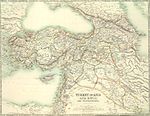History of the Turkish people
- This page is for Turkish people (Turkic people of Turkey), history of Turkic peoples can be found under History of Turkic people.
The Turks (Turkish people), whose name was first used in history in the 6th century AD by the Chinese [1][2], are a society whose language belongs to the Turkic language family (which in turn some classify as a subbranch of Altaic linguistic family.[3]) They identify themselves as being descended of Oghuz Turks who migrated to Anatolia in 11th century. Throughout history, the Turkic peoples have established numerous states in various geographical regions on the continents of Asia, Europe and Africa. Turks brought their culture to the places to which they had migrated and were also affected by the cultures of these regions.
Turks in ancient times
According to Chinese records, Turks appear in political history of Asia with the Huns. The Huns were a coalition of various central Asian nomads, including Turks. The Hun State which first appeared in the 3rd century B.C. became a significant and powerful state during the reign of its founder, Mete Khan. Having a defined and special strategy, Mete Khan defeated the Mongols and then the Yuechis and after, having conquered the western gates and trade routes of China under his control, gained significant economic power. When Mete Khan died, the Great Hun Empire was at its peak due to its military organization, domestic and foreign policies, religion, army, war strategies and arts.
After the collapse of the Asian Hun State, a new state called the Göktürk Empire was founded at the foot of the Altay Mountains. The Göktürks who were the first to employ the word "Turk" in their official state name, chose Ötüken, the former capital of the empire as a base and established khanates. Later they spread out and became an empire. They professed that a khanate could not be ruled by means of war and bravery alone and that wisdom was very important. Bilge (means wise) Khan and Kül Tegin are noted as the wisest and most heroic figures among Turkish statesmen in history. It was because of this that both these khans and Tonyukuk, another Göktürk Khan, immortalized their accomplishments with inscriptions. These inscriptions are the first written texts of the Turkish language.
Migration of the Turkic people to Anatolia
The main migration (expansion) of Turkish people occurred at the same time of Turkic migration between the 6th and 11th centuries (the Early Middle Ages), when they spread across most of Central Asia and into Europe and the Middle East.
The Seljuk Turks (Selçuk Türkleri) were the first Turkish power to arrive in the 11th century as conquerors, who proceeded to gradually conquer the land of existing Byzantine Empire.
Ottoman Empire

The successor of the Seljuks, was the Ottoman Empire (named after its first leader Osman Gazi), began as a small tribe of nomadic Turks who would come to dominate the region for 600 years. Its first capital was located in Bursa in 1326 and by 1453 under Sultan Mehmed II the Ottomans would conquer the last stronghold of the Byzantine Empire, Constantinople (much later known as Istanbul) (see fall of Constantinople). The Empire reached its peak under Sultan Suleyman the Magnificent between 1520–1555, where territories stretched from Hungary to the Persian Gulf, from Crimea to Algeria. Following the death of Suleyman, the Empire's expansion pace slowed with successive inept administrations and began a slow course of gradual decline in 18th century.
Throughout the 19th and early 20th century the Ottoman Empire began to lose a foothold on its territories, first with Algeria and Tunisia, then Greece, Egypt, Libya and the Balkans in the 1912–1913 Balkan Wars. Faced with territorial losses on all sides the Ottoman Empire forged an alliance with Germany who supported it with troops and equipment. In World War I the Ottoman Empire was forced into the War, after granting two German warships as refugees.
On October 30, 1918, the Armistice of Mudros (Mondros Mütarekesi) was signed, followed by the imposition of Treaty of Sèvres on August 10 1920 by Allied Powers, which was never ratified. These sought to break up the Ottoman Empire and force large concessions on territories of the Empire in favour of its rival Greece who had switched sides against the Germans. Greece and Italy were awarded parts of the coast of Anatolia (Asia Minor), while France were granted lands south of Taurus Mountains. The city of İzmir (Smyrna) was given to Greece.
Republic of Turkey
The Republic of Turkey was the successor state of the Ottoman Empire, following the overthrow of Sultan Mehmet VI Vahdettin by the new Republican assembly of Turkey in 1922. This new regime delivered the 'coup de grâce' to the Ottoman state which had been practically wiped away from the world stage following the First World War. The history is covered under three headings: War of Independence, single-party period and multi-party period.
Notes and references
See also
| History of Turkey |
|---|
 |
| Timeline |
|
|
